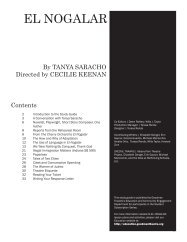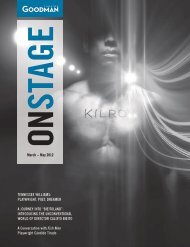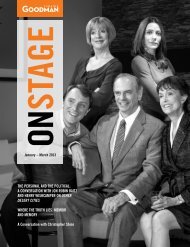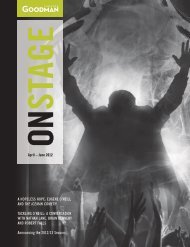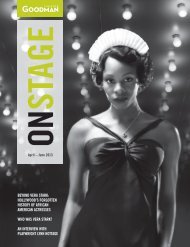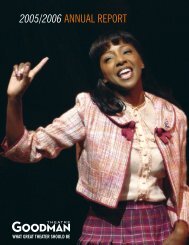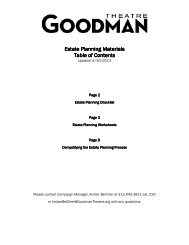Magnolia, atlanta and dr. Martin luther king jr. a ... - Goodman Theatre
Magnolia, atlanta and dr. Martin luther king jr. a ... - Goodman Theatre
Magnolia, atlanta and dr. Martin luther king jr. a ... - Goodman Theatre
You also want an ePaper? Increase the reach of your titles
YUMPU automatically turns print PDFs into web optimized ePapers that Google loves.
An Interview with Playwright Regina Taylor<br />
In a recent conversation with <strong>Goodman</strong><br />
Literary Manager Tanya Palmer, playwright<br />
<strong>and</strong> <strong>Goodman</strong> Artistic Associate<br />
Regina Taylor discussed her new play,<br />
<strong>Magnolia</strong>, which is set in Atlanta, Georgia,<br />
in 1962–1963, the year that Atlanta<br />
mayor Ivan Allen Jr. erected a barrier<br />
to slow the progress of integration.<br />
Tanya Palmer: I underst<strong>and</strong> that your<br />
research for <strong>Magnolia</strong> involved conducting<br />
first-h<strong>and</strong> interviews with people<br />
in Atlanta about their memories of the<br />
1960s. Was the story of Peyton Wall<br />
part of the play from the beginning, or<br />
did it come out of the interviews?<br />
Dr. King’s <strong>dr</strong>eam has been fulfilled in<br />
some ways? The presidential election of<br />
a black senator from Illinois makes this<br />
play wonderfully exciting to me right now,<br />
especially to be presenting it in Chicago.<br />
TP: One of the interesting things about<br />
the play being set in Atlanta is that<br />
while it is clearly a southern city, Atlanta<br />
approached civil rights <strong>and</strong> desegregation<br />
differently than other southern cities. Can<br />
you talk a little bit about that difference?<br />
REGINA TAYLOR<br />
RT: Atlanta was known as the black<br />
mecca of the South, just as Chicago<br />
was considered the black mecca of the<br />
North. Very clear lines separated the<br />
races in both cities, but both Atlanta<br />
<strong>and</strong> Chicago also had very prosperous<br />
black communities with strong hierarchies<br />
of people wielding power. Atlanta<br />
had Daddy King [<strong>Martin</strong> Luther King Sr.]<br />
<strong>and</strong> many other people who could wield<br />
power on both sides of the line. It was<br />
a city in which black people could own<br />
Regina Taylor: I wanted to write a play<br />
that could be produced in memory of<br />
Dr. <strong>Martin</strong> Luther King Jr. <strong>and</strong> honor his<br />
<strong>dr</strong>eams on the 40th anniversary of his<br />
death, so I started by researching the<br />
history of his birthplace, Atlanta. Peyton<br />
Wall came up in my research, <strong>and</strong> I<br />
thought ‘Oh! I didn’t know about that!’<br />
The play takes place in 1963, during a<br />
time of change <strong>and</strong> hope when the country<br />
was on the precipice of Dr. <strong>Martin</strong> Luther<br />
King Jr.’s mountain—<strong>dr</strong>eaming about the<br />
hopes <strong>and</strong> promises of the future. During<br />
the previous year, John Glenn had orbited<br />
the earth for the first time. When he<br />
returned to earth <strong>and</strong> touched American<br />
soil, he found the l<strong>and</strong>scape shifting <strong>and</strong><br />
the times changing. America had elected<br />
Kennedy the first Roman Catholic president<br />
<strong>and</strong> during that time, the invisible<br />
walls that had always divided the country<br />
<strong>and</strong> Atlanta, specifically, were becoming<br />
very visible <strong>and</strong> concrete.<br />
Writing this piece about Dr. <strong>Martin</strong> Luther<br />
King Jr.’s <strong>dr</strong>eam has been interesting,<br />
because as I was writing <strong>Magnolia</strong>,<br />
Barack Obama was elected president.<br />
And that is what propels the piece as I<br />
continue to work on it. How do we look<br />
at Atlanta, Georgia, in 1963, now that<br />
ANNA D. SHAPIRO received the 2008 Tony Award for Best Direction of a<br />
Play for August: Osage County. Directing credits at Steppenwolf <strong>Theatre</strong> Company<br />
(where she became an ensemble member in 2005) include The Pain <strong>and</strong> the Itch,<br />
I Never Sang for My Father, Man from Nebraska, Until We Find Each Other, The<br />
Drawer Boy <strong>and</strong> Side Man. Other credits include Our Town at Loo<strong>king</strong>glass <strong>Theatre</strong><br />
Company, A Number at A Contemporary <strong>Theatre</strong>, Iron at Manhattan <strong>Theatre</strong> Club,<br />
A Fair Country at Huntington <strong>Theatre</strong> Company <strong>and</strong> Traffic<strong>king</strong> in Broken Hearts<br />
at Atlantic <strong>Theatre</strong> Company. Ms. Shapiro is a graduate of the Yale School of Drama<br />
<strong>and</strong> Columbia College <strong>and</strong> the recipient of a 1996 Princess Grace Award. She<br />
joined the faculty of Northwestern University as head of the Graduate Directing<br />
Program in 2002.<br />
7



